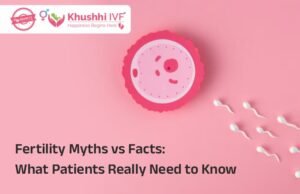Undergoing In Vitro Fertilization (IVF) is a significantly emotional journey, it brings us hope, but also a storm of emotions. For many couples, the dream of parenthood is clouded by tension, stress, fear, anxiety and an emotional toll that fertility treatments can bring. What’s commonly overlooked is how deeply stress can affect not just the mind, but also the body- and possibly the outcomes of IVF itself.
“The level of psychological distress in IVF patients is comparable to that of patients with cancer or heart disease.” – Domar et al., Fertility and Sterility, 1993.
How Stress Really Affects You During IVF
When you’re going through IVF, you are not just taking injections or attending appointments – you’re actually riding an emotional rollercoaster. And in the middle of all that, stress often sneaks in quietly…and stays.
Let’s talk about how that stress can really impact your journey – not just in your mind, but also in your body, relationships and even in your treatment.
- Your Body Feels It First
Stress is not just in the head – it is also in your hormones. When you’re anxious or overwhelmed, your body produces cortisol (a stress hormone), which can disturb with the gentle hormonal balance required for IVF to work smoothly.
Even though fertility medications help you to regulate your cycle, high stress can still affect how your body responds. It is like trying to grow a garden in a storm – everything is there but the environment makes it harder.
- Emotional Burnout is Real
You might start out feeling strong, hopeful, even excited. But over time – with every blood test, scans, two- week wait or unexpected delays – the emotional load starts to build. You might find yourself crying easily, feeling numb, or even wondering, “How much more of this I can take?”. This is emotional burnout, and it is completely normal to feel it – but then it also means your mind needs care just like your body does.
- It Affects Your Relationship Too (And That’s Okay)
No one really tells you how hard IVF can be on your relationship – until you’re in it.
One you might want to talk about every little thing in detail, while the other might shut down or avoid the topic. One might be with full hope, while the other could be preparing for the disappointment. And sometimes, both of you are emotionally drained out. This doesn’t necessarily mean that your relationship is broken. It just simply means you’re both human – and you’re coping with the way you know the best because your relationship is also going through IVF too, and not just your body.
And you know what the good news is? Many couples come out even stronger – not in spite of the struggle but because of how they supported on each other through it.
“Fertility treatment can challenge a couple, but it can also deepen their bond – when they allow space for honesty, softness, and support.” – Journal
- Why Taking Care of Your Mental Health Matters
You cannot control every outcome in IVF – but what you can is to care for yourself through it. This means seeing a fertility counsellor, practicing meditation, doing yoga, or simply taking a break when you need it. Managing stress is not all about being positive all the time – but it is about being kind to yourself, especially when things feel hard.





